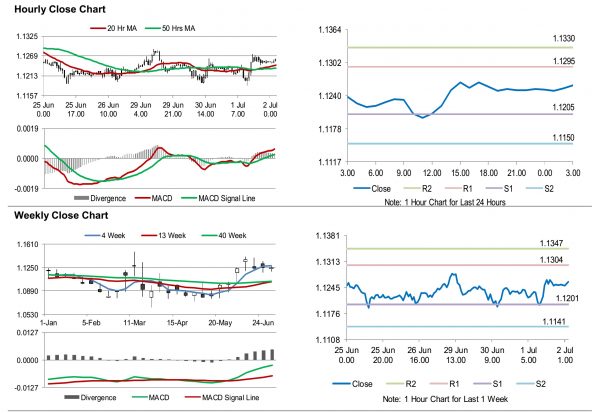For the 24 hours to 23:00 GMT, the EUR rose 0.16% against the USD and closed at 1.1253.
On the macro front, Euro-zone’s Markit manufacturing PMI climbed to 47.40 in June, compared to a level of 39.4 in the prior month. The preliminary figures had indicated an advance to 46.9. Separately, Germany’s unemployment rate rose less-than-expected to 6.4% in June, compared to a rate of 6.3% in the previous month. Moreover, the Markit manufacturing PMI climbed to 45.2 in June, compared to a level of 36.6 in the previous month. The preliminary figures had recorded an advance to 44.6. Additionally, retail sales jumped 13.9% on a monthly basis in May, compared to a revised drop of 6.5% in the prior month.
In the US, the ISM manufacturing PMI climbed to 52.6 in June, more than forecast for a rise to a level of 49.5 and compared to a reading of 43.1 in the prior month. Further, the Markit manufacturing PMI rose to 49.8 in June, compared to a level of 39.8 in the prior month. The preliminary figures had indicated an advance to 49.6. Meanwhile, the ADP employment increased by 2369.0K in June, less than expectations for a rise to a level of 3000.0K and compared to a revised increase of 3065.0K in the previous month. Additionally, construction spending unexpectedly eased 2.1% on a monthly basis in May, defying market expectations for a rise of 1.0% and compared to a revised fall of 3.5% in the previous month. Moreover, the MBA mortgage applications fell 1.8% in the week ended 26 June 2020, compared to a fall of 8.7% in the previous month.
Separately, the Federal Open Market Committee (FOMC), in its June meeting minutes, indicated that it expects loose policy to last “for many years” until the economy gets back to normal. Moreover, Fed officials see the need for “highly accommodative monetary policy for some time” and discussed new tools for conducting monetary policy. Also, some officials called for guidance tied to inflation or unemployment goals. Lastly, members agreed that there remained an extraordinary amount of uncertainty and considerable risks to the economic outlook.
In the Asian session, at GMT0300, the pair is trading at 1.1260, with the EUR trading 0.06% higher against the USD from yesterday’s close.
The pair is expected to find support at 1.1205, and a fall through could take it to the next support level of 1.1150. The pair is expected to find its first resistance at 1.1295, and a rise through could take it to the next resistance level of 1.1330.
Going forward, traders would keep a watch on Euro-zone’s producer price index and unemployment rate, both for May, slated to release in a few hours. Later in the day, the US nonfarm payrolls, average hourly earnings and unemployment rate, all for June, along with trade balance and factory orders, both for May, would keep investors on their toes. Also, US initial jobless claims would garner significant amount of investor attention.
The currency pair is trading above its 20 Hr and 50 Hr moving averages.

